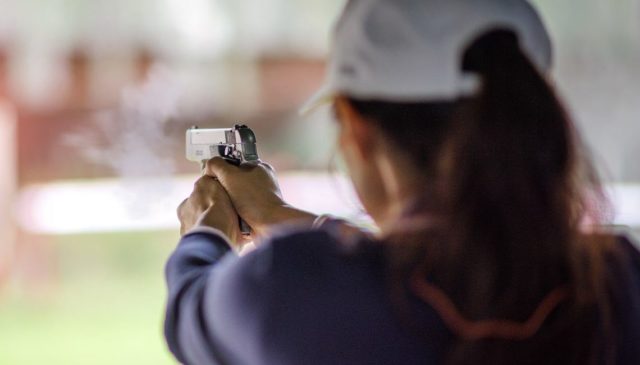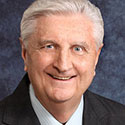Learning to Shoot and Not Drown
By Rabbi Cary Kozberg

In the Talmud, Tractate Kiddushin (29a), we learn: “The father is bound in respect of his son to circumcise, redeem (if the son is a first-born), teach him Torah, marry him off, and teach him a craft. There are those who say: to also teach him to swim. Why “teach him to swim”? The commentator Rashi explains that this is in case he is ever on a ship that is sinking, he will be in less danger of drowning.
As a parent and grandparent, I’m certainly in the company of “those who say”. But in light of the violence targeting Jews in Europe and now here in the States, as well as the continuing tirades against Jews spewed by radicals on both sides of the political and religious spectrums, I am also in the company of “those who say” that the responsibility to teach survival skills to our children should be expanded. I would amend the text to read: “And some say to also teach a child both armed and unarmed self-defense skills.” The accompanying commentary would read: “to also teach a child both armed and unarmed self-defense skills. Lest he/she be in a place where his/her life is suddenly in mortal danger from a violent person. With this in mind, our Sages have taught: ‘if someone comes to kill you, kill him first’ (Sanhedrin 72a).”
Over 28,000 deaths and myriads of wounded due to wars and ongoing terrorist attacks have taught the citizens of Israel the tragic truth of this lesson. Decades before the State was founded, Jews living in Eretz Yisrael realized that self-defense was a sine qua non to their existence. After the State was founded, this affirmation was fueled by the memory of the ashes of Auschwitz, which were still warm in 1948. Through the years, Holocaust awareness created the slogan “Never Again”—now part of contemporary Jewish jargon. But for Israeli Jews, it’s not just a slogan. Rather, it is the existential “equal” sign in the equation “self-defense=existence”. Without ambivalence, they know: if we don’t fight back, we die.
But despite the lessons Israel’s experience should have taught us, “ambivalence” aptly describes how much of the American Jewish Community still feels about Jews fighting back against those who wish to harm us. With a 13% increase in violent anti-Semitic incidents worldwide and 100 of these in the US alone (including 13 American Jews dead so far this year), American Jews may be united in declaring “never again”, but we are far from united in how to insure that those words remain a certainty. Indeed, the American Jews who nod in approval upon seeing young Israelis shlepping rifles around the streets of Jerusalem even when dressed in civilian clothes are often the very same Jews who recoil from the very idea of American Jews “packing heat”, especially in synagogue.
What accounts for this “disconnect”? Why does learning to protect ourselves from our enemies cause such unease in a community that honors the warrior king David and prays for the messianic coming of his descendant? How is it that Jews who annually celebrate Hannukah, commemorating an armed rebellion that insured the survival of Judaism, have attitudes so at odds with those of that rebellion’s leader–the priest Mattathias– who chided his fellow Jews that they must fight to defend themselves, even on the Sabbath? How is it that we reverently recall the heroism of the Warsaw Ghetto defenders on Holocaust Remembrance Day, yet can opine that today’s Nazi-imitating attackers are not evil, but merely maladjusted or ignorant? And why do we believe that our heart-felt pronouncements of “love trumps hate”—expressed most recently this past Yom Hashoa and in the aftermath of Pittsburgh and Poway– will alone protect us?
This last question is part of the problem itself. It was once said that the Holocaust was supposed to end Jew-hatred. Seven decades later, it has not disappeared, but has morphed into new virulent forms. Public statements, op-ed pieces, and interfaith vigils are all well-meaning and necessary. But they are clearly not enough.
Another reason for this “disconnect” is how American Jews generally view guns: that they are a priori evil. Despite the opinion of experts that signs prohibiting guns make worship venues more vulnerable to shooters who look for soft targets, these Jews prefer that synagogues still post such signs,. There are also those who may not view guns as evil per se, but still see them as an example of what was once called “goyishe naches”– things that only gentiles enjoy. And for Jews who lean left politically (as so many do), these attitudes are strengthened when guns are associated with political attitudes that they hold as anathema.
It often follows then that, should the community need the protection of armed security, it is better to leave it exclusively to “the professionals”. Rather than promote self-defense in our own ranks like our Israeli brethren, the conventional wisdom is: better to leave it to mercenaries (!) so we don’t get our own hands shmutzik (dirty).
But, invoking again the phrase “there are others who say”: without a robust approach to self-protection to supplement educational and diplomatic efforts, sentiments of goodwill toward others will ultimately be just bromides.
Think of fire safety. No one disagrees that knowledge of fire safety and fire prevention is a necessity even though statistically, fires rarely occur. But should a fire suddenly break out, knowledge of prevention is no longer the point: it won’t prevent the fire itself from spreading. Between the time the fire department is called and the time it arrives, the fire will need to be contained by “non-professionals” in whatever ways available. In such emergencies (think Pittsburgh and Poway), the persons who are present need to know how to effectively respond. The first responders may be minutes away, but it’s the seconds that count.
Those who advocate that synagogue security be left exclusively to “the professionals” forget that the professionals are not superheroes– just humans like the rest of us. Every law enforcement officer who carries a firearm had to be trained and is required to maintain competence with that firearm. It is part of their “continuing education”. Why should competence with firearms not be part of our Jewish “continuing education”, if only because it is immoral to expect others to risk their lives for our safety, if we are not prepared to take any risk at all?
But there is another compelling reason why wherever it is legally possible, Jews should learn responsible firearms use. Why does the Talmud teach “if someone comes to kill you, kill him first”? Because our lives are sacred. We are their stewards, and therefore have a responsibility to their Owner to protect them. The commandment hee-shamair l’kha u’shmor et nafsh’kha/take utmost care and guard yourselves (Deut. 4:9) makes use of a firearm in self-defense or in defense of others indeed a sacred act. Rabbi Yisroel Goldstein understood this—which is why he made sure a gun and a responsible person were ready…just in case. How many more lives would have been lost had that not been the case?
However, more Jews are coming around to this way of thinking. Individuals are seeking proper training and groups like Guns n’Moses, Glocks and Bagels, and Jews for the Preservation of Firearm Ownership can be found on social media. Resonating with the biblical teaching “a living dog is better than a dead lion” (Ecclesiastes 9:4), these Jews believe that living their lives is better than others delivering eulogies about their lives.
In the Book of Exodus, the Israelites find themselves between Pharaoh’s chariots and the sea. They cry to Moses that it would have been better to remain slaves than to die, as they believe they will. Moses responds by telling them to stand by and watch G-d’s deliverance. G-d responds: “Why do you cry out to Me? Tell the Israelites to go forward!”
It is a good bet that we will not experience the sort of dramatic rescue our ancestors experienced. But like them, a question and a risk confronts us: will we Jews in the Diaspora stand by and wait, or will we jump in? Will we avoid the water and possibly let others drown us? Or will we move forward?
Kinky Friedman once observed, “it’s time for the chosen ones to choose”. Our Israeli brothers and sisters have made their choice. How will we in the Diaspora choose?
This column originally appeared in The Times of Israel.
©2024. Rabbi Cary Kozberg. All rights reserved.

This article is courtesy of DrRichSwier.com, an online community of citizen journalists, academics, subject matter experts, and activists to express the principles of limited government and personal liberty to the public, to policy makers, and to political activists. Please visit DrRichSwier.com for more great content.

